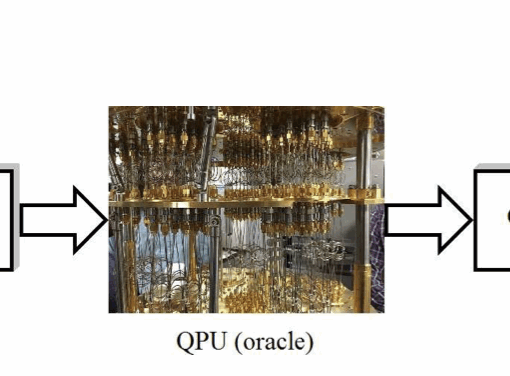
Rahko reaches groundbreaking accuracy on Honeywell’s latest QPU
Rahko presents the results from its latest Quantum Processing Unit implementation in a collaboration with Johnson Matthey and Honeywell.

Rahko presents the results from its latest Quantum Processing Unit implementation in a collaboration with Johnson Matthey and Honeywell.
Researchers at University of Maryland and the Duke University have managed to present the first implementation of Fault-Tolerant (FT) logical state preparation. They have experimentally demonstrated fault-tolerant preparation, rotation, error syndrome extraction, and measurement on a logical […]
Researchers at Osaka City University create a quantum algorithm that removes spin contaminants while making chemical calculations on quantum computers. This allows for precise and accurate predictions of electronic and molecular behavior with degrees of […]

Scientists at Florida International University have compared five techniques for the representation of a digital image inside a quantum processor. Since its inception nearly two decades ago, Quantum Image Processing (QImP) has always dealt with […]
Dementia is the fifth cause of death worldwide with 10 million new cases every year. Healthcare applications using machine learning techniques have almost reached the physical limits while more data is becoming available resulting from […]
Quantum algorithms offer a dramatic speedup for computational problems in material science and chemistry. However, any near-term realizations of these algorithms will need to be optimized to fit within the finite resources offered by existing […]
Collateral Debt Obligation (CDO) has been one of the most commonly used structured financial products and is intensively studied in quantitative finance. By setting the asset pool into different tranches, it effectively works out and […]
Arline announced the release of Arline Benchmarks which is the first open-source automated benchmarking platform for quantum compilers! The name was given to the honour of Arline Greenbaum, the first wife of Richard Feynman, one […]
Researchers at Google’s AI Quantum team have used a quantum computer to simulate a chemical reaction, the Hartree-Fock approximation of a real chemical system, for the first time. The reaction is a simple one, but this marks […]
BBVA is closely following through various lines of research aimed at exploring applications of quantum computing in the world of finance. As part of this work, and in collaboration with Spanish startup Multiverse, the joint research team […]
Scientists at the U.S. Department of Energy’s (DOE) Argonne National Laboratory have developed a new algorithm based on reinforcement learning to find the optimal parameters for the Quantum Approximate Optimization Algorithm (QAOA). QAOA allows a quantum computer […]
Researchers at Chicago Quantum continue to investigate the use of quantum computers in Finance. They have now looked for building an optimal portfolio out of a universe of 60 U.S. listed, liquid equities. Starting from […]
Researchers at the University of Sussex have created an algorithm that speeds up the rate of calculations in the early quantum computers which are currently being developed. They have created a new way to route […]
Researchers at IBM T. J. Watson Research Center discovered unexpectedly a new mathematical proof of quantum advantage – the elusive threshold at which quantum computers outperform classical machines in certain use cases. They study shows […]
Computer scientists at UCLA have shown that existing compilers, which tell quantum computers how to use their circuits to execute quantum programs, inhibit the computers’ ability to achieve optimal performance. Specifically, their research has revealed […]
Boltzmann machine is a powerful tool for modeling probability distributions that govern the training data. A thermal equilibrium state is typically used for Boltzmann machine learning to obtain a suitable probability distribution. The Boltzmann machine […]
Variational quantum eigensolver (VQE) emerged as a first practical algorithm for near-term quantum computers. Its success largely relies on the chosen variational ansatz, corresponding to a quantum circuit that prepares an approximate ground state of […]
Researchers at University of Sydney Nano Institute have developed the first system-wide quantum algorithm to characterize noise. Noise is the main obstacle to building large-scale quantum computers. To tame the noise (interference or instability), scientists […]
Many methods solve Poisson equations by using grid techniques which discretize the problem in each dimension. Most of these algorithms are subject to the curse of dimensionality, so that they need exponential runtime. Researchers at […]
The quantum computation of electronic energies can break the curse of dimensionality that plagues many-particle quantum mechanics. It is for this reason that a universal quantum computer has the potential to fundamentally change computational chemistry […]
Elyah has recently released its online circuit tool to program quantum computers. It comes built-in with a fast in-browser simulator, and a few more perks, like having the option to print your circuits. The tool, Qubit […]
A team of researchers affiliated with several institutions in China has developed a form of the board game Go using entanglement. The researchers created a version of quantum Go using entangled photons and found that […]
Researchers at University of Cambridge have presented an interesting paper regarding the usage of Reinforcement Learning to perform Qubit routing in Quantum compilers. Qubit routing refers to the task of modifying quantum circuits so that […]
A team from JPMorgan Chase, IBM Research Zurich and ETH Zurich presents a methodology to price options and portfolios of options on a gate-based quantum computer using amplitude estimation, an algorithm which provides a quadratic […]
Skoltech scientists have shown that quantum enhanced machine learning can be used on quantum (as opposed to classical) data, overcoming a significant slowdown common to these applications and opening a “fertile ground to develop computational […]
